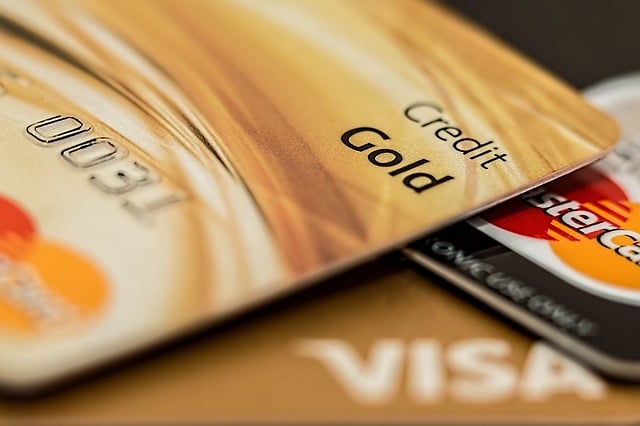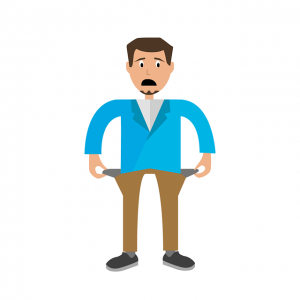How Borrowers Manage Personal Debt
Being in debt means that you owe money to someone else or to a financial institution. The most common form of debt is borrowing money from a bank or credit union in the form of a loan or credit card. The borrower then agrees to repay the borrowed amount plus interest over a specific period of time. Other forms of debt include mortgages, car loans, student loans, and personal loans.
Being in debt can be a financial burden as it requires regular repayments and can lead to financial stress if the borrower is unable to make the required payments. Debt means different things to different people, having some debt is perfectly healthy for your personal finances, but too much can lead to excessive stress or bankruptcy.
There is also a major difference between personal debt and business debt we’ll review in this lesson.
Personal Debt
Personal debt is not necessarily a bad thing. However, if you accumulate too much debt and are unable to pay it back in a timely manner, it can become a huge problem and lead to insolvency. The amount of debt considered too much varies, as having more debt requires bigger monthly payments to keep your accounts in good standing.
Generally, it’s important to avoid carrying over (from month-to-month) high-interest debt, such as credit cards, and prioritize hitting your monthly savings goals to remain in good financial shape.
Insolvency means that you are unable to repay your debts on time and in full.
When someone is insolvent, the total amount of their debts exceeds the total value of their assets. In other words, they do not have enough money or assets to pay off their debts. Insolvency can lead to bankruptcy, which is a legal process allowing an individual, or business, to get relief from their debts by liquidating (selling off) all their assets or creating a repayment plan.
It is important to seek help from a financial advisor or a bankruptcy attorney if you are facing insolvency or having trouble with debt.
Sources of Personal Debt
There are many sources of personal debt, some are considered healthier than others.
Credit Card Debt

Credit card debt refers to when a cardholder has an outstanding balance on their credit card and does not pay it off in full at the end of each billing cycle. Interest is charged on the outstanding balance and continues to accrue until it is paid off. Making only the minimum payment required can lead to paying back significantly more in interest charges over time.
Using a credit card responsibly can help build a person’s credit score, demonstrating a history of trustworthy borrowing and opening up opportunities for larger loans in the future. However, credit card debt that grows too quickly, or isn’t paid off, can lead to serious financial trouble, particularly for young people.
Having a credit card can be tempting for students or individuals starting their first jobs, as it can be a convenient way to bridge financial gaps between paychecks or student loan disbursements. However, it’s essential to understand how credit cards work. Racking up large amounts of credit card debt can result in large monthly payments that may be difficult to manage. Additionally, the longer the balance remains outstanding, the more interest accrues, making it even more expensive in the long run.
Credit card debt does have its place in most people’s financial lives, though. When used appropriately, credit cards can be a great way to build up a credit history, and most credit card companies offer reward programs that can make credit cards more attractive to use than cash for everyday purchases.
Student Loan Debt

Many university students rely on student loans to finance their education. Student loans are a type of lump-sum debt that is typically paid out every semester or year, but does not need to be repaid until after the borrower graduates from the university and finds a job.
Student loans can make it possible for more people to pursue higher education and focus on their studies without worrying about financial burdens. Even students who work part-time jobs may still take out a student loan to help cover tuition costs. However, the downside of student loans is that they can saddle graduates with a significant amount of debt.
It’s important to note that interest on the student loan begins accruing as soon as it is dispersed, even though it doesn’t have to be repaid right away. This means that the longer a borrower waits to start paying it back, the bigger the debt becomes.
Student loan debt is also treated differently from other types of debt. Unlike other debts that can be discharged through bankruptcy, it’s difficult (though not impossible) to discharge student loan debt. This is to prevent graduates from declaring bankruptcy immediately after finishing school and having their debt cancelled. Regardless of how insolvent a borrower becomes, they will still need to repay their student loans.
In recent years, the government has implemented measures to retrieve overdue student loan payments by keeping a portion of the borrower’s income tax returns. Students should try to borrow only what they need to cover educational expenses to minimize their overall student loan debt and make sure they can afford monthly payments after graduation.
Mortgages and Car Loans

Mortgages and car loans are examples of collateralized loans that allow borrowers to finance large purchases like homes and automobiles. The properties being purchased are usually used as collateral, meaning that if you fail to pay back the loan, the house or car could be repossessed to pay back the debt.
These loans are typically looked at as positive debt, since they are necessary for many people to achieve their financial goals. However, borrowers should be careful to choose the right loans with decent interest rates and a schedule of payments they can afford. The downside is that these loans are often much larger than what you’d see with normal credit card debt and can take many years to pay off.
When taking out a large loan, it’s important to have a plan to make your monthly payments no matter what happens financially. If, for example, you take out a 20-year mortgage on your house, you need to have a plan to keep making mortgage payments for the next two decades, even if you lose your job or have unexpected financial expenses.
If you find yourself having trouble making payments, it’s usually better to sell the house or car voluntarily instead of waiting until creditors seek repossession. This can help avoid negative impacts on your credit score and give you more control over the situation.
Impact of Debt on your Net Worth
Net worth is calculated by subtracting your liabilities (debts) from your assets. When you have more debt than assets, this can result in a negative net worth. For example, if you have a car worth $10,000 but owe $15,000 on a car loan, your net worth would be -$5,000. This means that you owe more than you own and you have a negative net worth.
On the other hand, certain types of debt, like a mortgage or a low-interest student loan, can be considered good debt, offering you a good return on investment in the long run. When looking at increasing your net worth, consider the lifetime growth of your assets against the debt needed to fund the purchase of those assets.
Defaulting On Personal Debt – Creditor’s Options
If you default on your debt, it means you are unable to repay it, and your creditors will start attempting to recover their losses. This can lead to debt collection for them or bankruptcy protection for you.
There are different legal methods that creditors can take to collect their debt from you. During this process, there are consumer protections to safeguard you against illegal practices.
Repossession
If you posted anything as collateral for your loan (like your car), the creditor can take possession of that item if you stop making your loan payments, and they can usually do this without notifying you. The creditor can then sell off what is repossessed and use the sale to satisfy the amount that was owed. If they can’t get back the amount that you owe them after the sale, you may still be liable to pay back the difference.
Wage Garnishment
If there was no collateral involved with the loan, the creditor can sue you, which forces you to pay back the loan amount. The court system provides different methods to recover the money. One common method is wage garnishment. In this method, a certain amount of money is taken out of your paycheck directly and sent to the creditor before you even see it. There is usually a cap on how much can be taken, generally no more than 25% of your paycheck, but the cap can be lower depending on the state you live in.
Property Lien
A property lien is another type of court order, where a creditor can use to recover money from an unpaid debt. A property lien is a public statement saying that you owe the creditor money, and that until that debt is repaid, the creditor now owns a piece of your property. Having a property lien does not immediately do anything to you, but it opens up the door to foreclosure. The creditor could force the sale of your property to satisfy the debt you owe.
Most creditors prefer to avoid foreclosure since it is a lot of work to arrange the sale, so foreclosure is typically left as a last resort. Instead, if you have a property lien against an asset, you’ll use the proceeds from the sale to pay off the debt. After the lien is paid, you’ll have a clear title that you can use to transfer ownership to the new owners. If your creditor does decide to foreclose on your property, they only have a right to the amount of money that they’re owed. If the property is sold for more than you owe, you get to keep the rest of the money.
Defaulting On Personal Debt – Debtor’s Rights
Even if you default on your debt, you still have certain rights and options available.
The Fair Debt Collection Practices Act (FDCPA)
The Fair Debt Collection Practices Act is a consumer protections measure that helps protect individuals from unfair harassment by their creditors. It makes it illegal for creditors to
- Call you before 8 a.m. or after 9 p.m.
- Call you at work if you tell them your boss does not allow it.
- Publicly post your name and address as a bad debtor.
- Pretend to be a lawyer or police officer to force you to pay your debt.
- Pretend they have a court order when they don’t.
- Contact you at all if they know you are represented by a debt attorney.
- Contact your friends/family/co-workers and tell them about your debts.
- Contact you (other than with official court papers) after you explicitly request in writing that they stop.
The (FDCPA) Act also requires anyone who contacts you about your debt to tell you who they are calling on behalf of, and the total amount you owe. If a debt collector breaks any of these rules, they can be penalized by the Consumer Financial Protection Bureau.
Bankruptcy

Bankruptcy is a legal process that individuals who are unable to pay their debts can go through to get financial relief. There are several types of bankruptcy, but the most common type for individuals is Chapter 7 and Chapter 13 bankruptcy.
Over 90% of all bankruptcies are Chapter 7 bankruptcies, where the individual’s non-exempt assets are liquidated, and the proceeds are used to pay off their creditors. The individual’s debts are then discharged, meaning they are no longer legally obligated to pay them. However, not all debts can be discharged, including student loan debt, taxes, and child support payments. A trustee takes possession of all your property and assets and sells them. The proceeds are then distributed between your creditors.
In a Chapter 13 bankruptcy, the individual proposes a repayment plan to their creditors, based on their income and expenses. The repayment plan is usually 3 to 5 years, and at the end, any remaining debts may be discharged. The individual typically keeps their assets and pays back a portion of their debt.
To file for bankruptcy, an individual must first undergo credit counseling from an approved agency. They will then need to file a petition with the bankruptcy court and provide various financial information, including their income, debts, and assets.
Once a bankruptcy petition is filed, an automatic stay goes into effect. An automatic stay is a temporary court order that immediately brings a halt to most forms of collection activities on behalf of the creditors, including phone calls, letters, lawsuits, garnishments, and even foreclosures.
However, the person who filed for bankruptcy will be unable to obtain any new credit for 3 to 5 years. This impacts financial transactions such as getting a credit card or even renting an apartment. A bankruptcy will appear on your credit report for 7 years. Remember that using credit deals with trustworthiness, so declaring bankruptcy shows others that you didn’t hold up your end of the deal. You will need to work extremely hard to repair your financial reputation.
Debt and Borrower Protections
Debt is a big deal and there are some basic consumer protections in place to make sure you are treated fairly by your creditors. One of the biggest consumer protection agencies for credit and debt is the Consumer Finance Protection Bureau (CFPB). Their role is to enforce rules on how banks and financial institutions can market credit and debt products to consumers and this is where you can file a formal complaint if you believe you have been treated unfairly.
Business Debt
Debt for businesses differs from debt for individuals in several key ways, mainly due to the differences in purpose, financial structure, and borrowing capacity between businesses and individuals. Businesses (especially big businesses) are in debt nearly all the time. Making payments on this debt is generally considered part of their normal operating expenses.
Why is debt different for businesses?
Here are some reasons why business debt differs from personal debt:
- Purpose: Businesses often use debt to finance growth, expansion, or improvements in their operations, with the aim of increasing profits and shareholder value. In contrast, individuals typically take on debt for personal consumption, such as buying a home, car, or for education. While some personal debt can be considered an investment, such as a mortgage or student loans, much of it is for non-investment spending.
- Cash flow: Businesses typically generate consistent cash flows from their operations and can use this income to service their debt obligations. In contrast, individuals may have more variable income streams and financial stability, depending on their employment and economic circumstances.
- Financial structure: Business debt is often structured differently from personal debt. Companies can issue corporate bonds, obtain lines of credit, or take out long-term loans for various purposes. These can be either secured or unsecured and have specific terms and conditions attached. Personal debt usually takes the form of mortgages, credit card debt, or personal loans, with simpler structures and repayment terms.
- Tax implications: Businesses can often deduct interest payments on debt as a business expense, reducing their overall taxable income. This can make debt more attractive as a financing option compared to issuing equity. In contrast, individuals usually cannot deduct interest payments on personal loans or credit card debt, with some exceptions like mortgage interest on a primary residence. This difference in tax treatment can make debt more cost-effective for businesses compared to individuals.
For individuals, we’re mostly concerned with how big our debt is, but a business only needs to worry about how much they are paying back relative to how much they are earning. If their earnings keep increasing, then there isn’t a problem if their debt is increasing too, as long as their debt is not growing faster than their revenues.
Challenge Questions
- In your own words, explain what debt is.
- List as many different types of debt as you can.
- How can having debt cost you more money?
- What message or warning would you give to anyone before they get into debt?
- Are there any pieces of advice that you would share with others about managing their money to avoid debt?